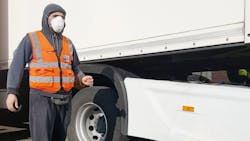FMCSA extends COVID-19 relief exemptions through rest of 2020
The Federal Motor Carrier Safety Administration (FMCSA) has extended its pandemic-related emergency exemption through the rest of the year. This is the sixth extension of the order, which will now last through Dec. 31.
The FMCSA extension was previously set to expire on September 14, but continues to cover the extended emergency relief for the following categories only:
- Livestock and livestock feed
- Medical supplies and equipment related to the testing, diagnosis and treatment of COVID-19
- Supplies and equipment necessary for community safety, sanitation, and prevention of community transmission of COVID-19, such as masks, gloves, hand sanitizer, soap and disinfectants
- Food, paper products and other groceries for emergency restocking of distribution centers or stores
“Direct assistance does not include routine commercial deliveries, including mixed loads with a nominal quantity of qualifying emergency relief added to obtain the benefits of this emergency declaration,” according to FMCSA's declaration.
FMCSA stated that the following categories continue to no longer be covered under the newly modified exemption, originally covered by the May 13 extension:
- Immediate precursor raw materials such as paper, plastic or alcohol
- Fuel
- Liquefied gases to be used in refrigeration or cooling systems
- Equipment, supplies and persons necessary to establish and manage temporary housing, quarantine, and isolation facilities related to COVID-19
- Those designated by federal, state or local authorities for medical, isolation, or quarantine purposes
- Those necessary to provide other medical or emergency services, the supply of which may be affected by the COVID-19 response
FMCSA concluded that motor carriers and drivers providing direct assistance to the national emergency are not granted emergency relief from, and must continue to comply with, the following regulations and conditions:
- The operation of a commercial vehicle in accordance with state laws and regulations, including compliance with applicable speed limits and other traffic restrictions.
- The operation of a commercial motor vehicle while a driver's ability or alertness is so impaired, or so likely to become impaired, through fatigue, illness, or any other cause, as to make it unsafe for him/her to begin or continue to operate the motor vehicle.
- Motor carriers shall not require or allow fatigued drivers to operate a commercial vehicle. A driver who informs a carrier that he or she needs immediate rest shall be given at least 10 consecutive hours before the driver is required to return to service.
- The prohibitions on texting while driving and using a handheld mobile device while driving.
- A motor carrier whose driver is involved in a crash while operating under this emergency declaration must report any recordable crash within 24 hours, by phone or in writing, to the FMCSA Division Office where the motor carrier is domiciled. The carrier must report the date, time, location, driver, vehicle identification, and brief description of the crash.
- Nothing in this emergency declaration extension shall be construed as an exemption from the controlled substance and alcohol uses and testing requirements, the commercial driver’s license requirements, the financial responsibility (insurance) requirements, the hazardous material regulations, and applicable size and weight requirements.
- Motor carriers or drivers currently subject to an out-of-service order are not eligible for the relief granted by this declaration until they have met the applicable conditions for its rescission and the order has been rescinded by FMCSA in writing.
- Direct assistance terminates when a driver or commercial motor vehicle is used in interstate commerce to transport cargo or provide services that are not in support of emergency relief efforts related to COVID-19, or when the motor carrier dispatches a driver or commercial motor vehicle to another location to begin operations in commerce. Upon termination of direct assistance to emergency relief efforts related to COVID-19, the motor carrier and driver are subject to the requirements of 49 CFR Parts 390 through 399, except that a driver may return empty to the motor carrier’s terminal or the driver’s normal work reporting location without complying with Parts 390 through 399. When a driver is moving from emergency relief efforts to normal operations, a 10-hour break is required when the total time a driver operates conducting emergency relief efforts, or a combination of emergency relief and normal operations, equals 14 hours.
About the Author
Catharine Conway
Digital Editor
Catharine Conway is a past FleetOwner digital editor who wrote for the publication from 2018 to 2022.

